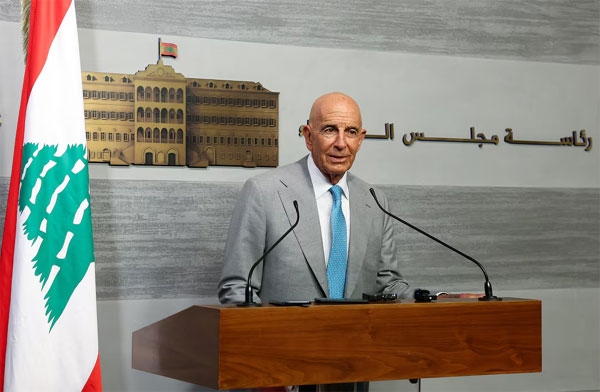Daijiworld Media Network - Beirut
Beirut, Jul 22: In a visit marked by cautious diplomacy and complex regional dynamics, US Special Envoy Thomas Barrack emphasized Washington’s commitment to supporting Lebanon’s sovereignty — while making clear that the United States does not intend to pressure Israel into any specific actions.
“The US has no business in trying to compel Israel to do anything,” Barrack stated bluntly at a press conference on Monday, following a meeting with Lebanese Prime Minister Nawaf Salam.
Barrack, who also holds the positions of US Ambassador to Turkey and Special Envoy for Syria, arrived in Beirut for his third visit since June, meeting with top Lebanese officials as well as political and religious leaders, according to Xinhua news agency.

While acknowledging that a ceasefire agreement between Lebanon and Israel was in effect, Barrack admitted that the truce has failed to hold in practice. He pointed to the underlying causes of its breakdown and described the current moment as one requiring “collective efforts” to rebuild peace and stability.
“The ceasefire didn’t succeed — and we recognize why. Our job is to help diplomatically, not dictate,” he said, underlining the US strategy of influence over intervention.
On the contentious issue of Hezbollah’s arms, Barrack said the topic is “a deeply internal matter,” and emphasized that the United States is prepared to collaborate with the Lebanese government in finding ways to support long-term solutions without imposing external demands.
In a significant development earlier in the day, Lebanese President Joseph Aoun handed over a draft memorandum to Barrack, reaffirming Lebanon’s commitments under the ceasefire deal signed with Israel on November 27, 2024.
According to Lebanon’s presidency, the document outlines Lebanon’s plans to:
• Establish full state authority across its territory via its national armed forces
• Restrict the possession of weapons solely to the Lebanese military
• Ensure that decisions on war and peace rest exclusively with the country’s constitutional institutions
The memorandum also stresses Lebanon’s focus on rebuilding and economic revival, alongside the preservation of sovereignty across its international borders.
Despite the US- and French-brokered ceasefire agreement — which included a commitment to a complete Israeli withdrawal from southern Lebanon — the Israeli Defense Forces have continued periodic strikes, claiming to target Hezbollah positions. Israel also retains control over five strategic outposts along the Lebanon border, in defiance of a February 18 deadline for withdrawal.
As tensions persist on the ground, Barrack’s visit signals a renewed push for a diplomatic path forward, though the limitations of US influence in the region remain starkly evident.